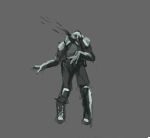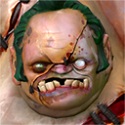|
I've got a group of mostly newbies ready to start a campaign of Gamma World, and I wanted to try to challenge them to come up with interesting characters. Most everyone involved does improv comedy, so it shouldn't be too big of a deal getting them to come up with ideas, I just want those ideas to be in service of the larger over-arching campaign. I don't want them to have to come up with full biographies for their characters, but I wanted them to write down SOME personality/history of their characters so that I could try to craft some more interesting encounters later on which would fit the group well. I vaguely remember reading a post on the forums about a DM who has their characters write down seemingly unrelated traits (like goals) and use that to organically build their character, but I can't find it. It almost reminded me of the system you use in Fiasco (every character has a goal/relationship/location), except slightly broader and more tailored towards a GM'd on-going campaign game. Thoughts and suggestions?
|
|
|
|

|
| # ? May 26, 2024 22:32 |
|
How much of the setting is already set in stone? I've had good luck asking players a few questions about their characters, and the questions are the same ones I use when I'm coming up with a backstory for myself. - Where are you from? - Why did you leave? - Who was happy to see you go? - Who misses you or what do you miss? - What in the world do you avoid and why? "Why" is the king of story-building questions, I feel. Usually one or two of these will give someone an idea for a backstory - they don't all need to be answered methodically. For example, the doctor might have left a scientific enclave, fear the police, and be missed by his dog he left behind. Why? Maybe the research was unethical and abominable so he fled the enclave. Now the corporation that ran it is after him because he knows too much, the police are after him for his involvement in the operation, and he just wants to clear his name and expose the corporation - which he could do if he found Scruffy, who secretly has important company secrets encoded into his DNA.
|
|
|
|
Stunt Rock posted:Improv and alignment. I think I've written this post before but here's a less 3 am version. I started to really think about D&D Alignment and see it as a weak link when I got invited to play GWB Nobilis. Now in Nobilis there are two aspects of character creation that can kind of be applied to alignment as I now use it in Dungeons and Dragons and other D20 games. The first we'll cover is Codes. Codes in Nobilis are kind of like alignment. They represent what kind of supernatural beings your character mostly agrees with. These include the Angels of Heaven, the Fallen of Hell, the Dark, the Light and the Wild. What makes this different from other alignments is A) Nobles and Imperators consider themselves beyond good and evil. Hell has its upsides and Angels can be just as genocidal as anyone. This leads into B) The Codes are all pretty dogmatic and "playing your alignment" mostly varies on how devout your character is. It's perfectly possible in Nobilis to play an agent of Hell that loves beauty and tries to make tings pretty. You'll probably never score character points for serving your Code. But that's actually okay since there are a lot of ways to do that. You won't suddenly start losing god powers because you haven't created enough pain and corruption. I mostly only use this example when dealing with people that like to play Divine or really devout characters. But it's mostly to show that in terms of Alignment spells and whatnot I threw out the grid and encouraged a servant of Sehanine to act like a tricky moon goddess would want her servants to act. Not to whinge over if taking treasure from a bandit cave was Lawful. The second part of the character sheet I looked at was Bonds and Anchors. And this is where I found that any character can be vastly improved by the player thinking about who they were playing instead of picking one of nine options. Bonds and Anchors are things that a single character cares about. Since there are many types of people this spans everything from finding a good cup of tea to the comfort of a loved one to thou shalt not suffer a witch to live. Since you're playing Gamma World I'll say I'm playing Bosco the Boarman. Now as I imagine Bosco's not the deep thinking type. In fact, the only thing he only really ever thinks about is whether or not a decrepit old building has unspoiled cans and packages of pre-apocalypse food. And this is because on the last birthday before his dad disappeared into the scorched remains of Idaho he gave Bosco a Sweet Nikki Creme Cake. Now if this were a short conversation with one of your players you've got two things that you can hook me, your player with. You also have a guideline for what not to wave in front of my nose to make me go on an adventure. If it's a rumor of a salt mine with some notes on how the world went to hell or a silo with some grains that may be farmable in the wastes? I'm not interested. My character's not a big picture guy. But if he passes a flaming Gas 'n Gulp and spots a Sweet Nikki display there's a little hook for him to try something risky for a small reward. Maybe it's a pain in the rear end and I take some damage but I find a case of Creme Cakes. I haven't run gamma world but there's gotta be a consumable you could reskin and have as an appropriate reward. And while writing this I only thought the birthday present bit was a small piece of backstory. But a good way to get me involved in the story is to hand me bits of rumor about a boarman that's been running around the Idaho panhandle and into Montana. Maybe my character now cares about the salt mines of footage and irradiated seeds, not because I want to rebuild society. But because it turns out that's what dad was working on and I want to know why the hell he left. So yeah, five minute chats before session one > Alignment grids. Screw alignment grids.
|
|
|
|
General question: What are some cool things D&D characters can do in major cities? I'm DMing my first campaign (4e), so it is fighty as gently caress so far. However, the players will be heading to a sorta-major city soon, and so far the capitol (Greyhawk-esque) has been off limits because ~*bullshit plot reasons*~ but that will be ending soon. I want my "cities" to be more than "a place you go to to talk to One Dude" and have some skill usage and investigation moreso than combat (although unconventional warfare would be cool) Any help would be appreciated, and I will give specifics on the campaign if people would like some background. I will also have a fair bit of time before our next session, so feel free to make more complex suggestions; I'll have the time to put it together.
|
|
|
|
P.d0t posted:General question: What are some cool things D&D characters can do in major cities? That depends on the city in question. You could find a lot to do if say, there's a major event on or a massive political controversy or something. Generally you'll want any conflict to be something that can't just be immediately solved by hitting it with a stick, which is why cities often lend themselves to mysteries and investigations. The complex layouts of an average city tend to be a great place to stage shady underground dealings, and each class or guild will probably have their own opinions on it. For example: The rich may be ignoring the needs of the poor need done and so the poor might be harboring a thieves' guild in exchange for added protection. If you're after unconventional warfare a corrupt city guard or organized crime syndicate is always a good standby because of their apparent legitimacy which prevents them from being legally shut down. You could also have them uncover a network of spies for an enemy city working on something nefarious (perhaps sabotage?). Just don't do what my DM did and have a murder cult in the sewers. It should be pretty obvious but nobody wants to go adventuring in the sewers. Just have the city build them too small to hide in and if there's a murder cult put them somewhere else. Like for example in the back rooms and basements of a temple to an obscure, if benign god which has been met with unusual popularity over the past few weeks.
|
|
|
|
P.d0t posted:General question: What are some cool things D&D characters can do in major cities? Make 10 bullet points, and write down a single sentence thing for each: e.g. 1) "The party encounters a shop which has been set on fire by an arsonist" 2) "The party witnesses a woman being thrown out of a large establishment, in tears with torn clothes" 3) "There is a shortage of quality metal in the city, and no-one seems to know why" 4) "There has been an outbreak of sickness in the SW of the city, and no-one knows the origin" etc, and then you can generally roll with it. Outline the ruler of the city, some important figures, and give the PCs a suggestion, and they usually have their own things they want to do!
|
|
|
|
Lord Twisted posted:Make 10 bullet points, and write down a single sentence thing for each: This is a good idea and should be repeated for every city. One of my favorite games is Pendragon, which is set in the days of King Arthur, with the players aspiring to become Knights of the Round Table and suchlike. There are two major cities in Pendragon's Britain - Camelot, and London. And 'random encounter' tables are provided for both... and they're completely different. Like, in Camelot you might encounter some wandering minstrels who are playing songs about glorious knights on quests, and you can listen to get ideas for new quests to set out on... while in London, you might be walking down the street and someone on the third floor empties a chamber pot on your head. One's an unrealistically bright and pleasant and Chivalric ideal, and the other is an urban hellhole. Think about what kind of city it is, and run from there. Make it more than just "generic Fantasy city."
|
|
|
|
Lord Twisted posted:Make 10 bullet points, and write down a single sentence thing for each: Building on this, write some questions. What is the cardinal of the local church for the clerics god hiding? Who does the paladin know that's involved in the current power struggle for the position of patrician of the city? What's causing the sickness in the poor quarter? Who is the thieves guild backing for the position of captain of the guard? Don't worry too much about the answers, discover them in play!
|
|
|
|
Factions, factions, factions. Figure out three to five organisations per city and work out what they want, what their members are like, how they exert influence, what they're trying to do, and where they're conflicting with the others. Then assume that in any given scene, at least one (usually more) will have someone loyal to them there: not a spy, but a friend of a friend who passes interesting news (like the arrival of a bunch of tooled-up adventurers) up the food chain. Plot and good times and politicking pretty much write themselves from there on in.
|
|
|
|
Each town should have multiple factions, all willing to work with mercenaries in some manner. All towns might have competitions the players can take place in to win prizes. All towns might have crimes the players could solve. All towns might have political issues the players could place themeselves in the middle of. ALl towns have rich men. And all rich men have homes. All of these homes have valuables in them. All towns should have places to play games, gamble, drink. All towns need shops. All towns need places the characters can learn in, or train from. Towns should have organized fighting, like arenas. All towns should have secrets. All towns should, feasibly, be something the party could take over if so lucky and inclined. I like putting carnival style games in my towns. Little Smash-TV style dungeons the player can try their hand at by paying a fee. They cannot die here, only be removed from the virtual game. Many prices can be uncovered in these game-attractions. If you have a town, you'll need police - all would have adventure hooks. Rulers - With adventure hooks. Cults- with adventure hooks. Thieves Guilds with adventure hooks. As well as secret organizations like Zentharim or the Harpers, with adventure hooks. Now the players might want to bypass all that poo poo to find their one guy... That's fine. But if they're good players they will find their one guy. Go shopping. Then go to a bar and ask for rumors. These rumors should lead them on a path that there are plenty of things to do in this town.
|
|
|
|
Cities also become near-obsolete as adventuring locations after the Heroic tier in 4e, because the party can (and so often does) become murderous threatening assholes to the normal humans who run the city when those humans obstruct the party in any way. Yes, you can make it so that the mayor is actually a level 20 vampire or put an Elder God under the city, but that's just one city. Don't put too much effort into Every City, is what I am saying. It's one of the best RPGs made to date, but this issue is the thing I like least about 4e.
|
|
|
|
Well to be fair that's why, after heroic tier, you tend to visit places like Eladrin cities floating on waterfalls, metal cities painstakingly erected amidst the turmoil of the Elemental Chaos, or the city where dreams live. I had a lot of fun once when my party hit Paragon tier and decided to go back to one city that was firmly in the hands of a thieves guild, where they'd been framed for a major crime months ago, and oust the guild leaders, unravel their schemes and reinstate the citizens' council in one night with ample time to spare for a celebration.
|
|
|
|
homullus posted:Cities also become near-obsolete as adventuring locations after the Heroic tier in 4e, because the party can (and so often does) become murderous threatening assholes to the normal humans who run the city when those humans obstruct the party in any way. That's why when you hit Paragon, adventurers become the kind of people who run cities. And then they have to worry about not upsetting the king next door: sure, with the PCs at their head the city could defeat his army, but the ensuing war will mean one less ally against the PC's real enemies.
|
|
|
|
Whybird posted:That's why when you hit Paragon, adventurers become the kind of people who run cities. And then they have to worry about not upsetting the king next door: sure, with the PCs at their head the city could defeat his army, but the ensuing war will mean one less ally against the PC's real enemies. For sure. It might be a problem with my own imagination, but I just see Cretaceous-extinction-level reduction in city-based adventuring after Heroic tier. Some species of adventure survive, but "woman bleeding from her head stumbling through the streets, what do you do" is gone like the dinosaurs.
|
|
|
|
Are good guidelines out there for how much XP to give in a 3.5 campaign that is not combat driven or do I just have to wing it based off the pace I want to set? I am getting a pathfinder game setup in the Planescape universe in mid march and while I have a lot of the details hammered out I don't know how to award xp as there are a lot of non-combat problems I want solved and stuff like that does not really have a CR.
|
|
|
|
TheGreySpectre posted:Are good guidelines out there for how much XP to give in a 3.5 campaign that is not combat driven or do I just have to wing it based off the pace I want to set? I am getting a pathfinder game setup in the Planescape universe in mid march and while I have a lot of the details hammered out I don't know how to award xp as there are a lot of non-combat problems I want solved and stuff like that does not really have a CR. The general guideline is somewhere between 10% and 25% of XP to level depending on the significance of the encounter and the desired advancement speed. You can use the CR table as a guideline, even if the non-combat encounter isn't an obstacle with a quantifiable CR. For most of my RP-heavy sessions I'll just give out a summary abstract-XP reward at the end of the session rather than trying to break it down per-scene. Paolomania fucked around with this message at 19:39 on Feb 20, 2013 |
|
|
|
Whybird posted:That's why when you hit Paragon, adventurers become the kind of people who run cities. And then they have to worry about not upsetting the king next door: sure, with the PCs at their head the city could defeat his army, but the ensuing war will mean one less ally against the PC's real enemies. That's more or less the guide I've been using, and it's worked well so far. It's also fun to tie things together between tiers: "Well, you've solved Hamlet Town's problems, but now you've pissed off Metropolis!" "Having resolved the disasters and plagues in Metropolis, you learn the Empire wants to claim its new-found potential for its own!" "Now that you've kicked in the Empire's teeth you've really pissed off the god of conquest - might want to do something about that."
|
|
|
|
TheGreySpectre posted:Are good guidelines out there for how much XP to give in a 3.5 campaign that is not combat driven or do I just have to wing it based off the pace I want to set? I am getting a pathfinder game setup in the Planescape universe in mid march and while I have a lot of the details hammered out I don't know how to award xp as there are a lot of non-combat problems I want solved and stuff like that does not really have a CR. 14 average encounters per level. Keep in mind an encounter is not necessarily combat. It simply has to represent a challenge with risk, reward, and relevance.
|
|
|
|
Paolomania posted:For most of my RP-heavy sessions I'll just give out a summary abstract-XP reward at the end of the session rather than trying to break it down per-scene. I think this is probably what I will end up doing as I have a good idea of the amount of encounters ( both combat and noncombat) that will happen each so I can just break up my pacing from there. I'll try to figure that in with the ~14 encounters a level as suggested by others for pacing and adjust as necessary. Thanks
|
|
|
|
Thanks for all the advice, everyone. To give a little bit of specifics from the actual campaign... Prior to the start of the game, the Royal Family in the capitol city was murdered in the night by a rebel group, which was then ousted by the army/police (basically one and the same in-game). Since then, the capitol has been under martial law, a cop on every street corner, no one in or out etc. The PCs, who were mercenaries on retainer to a member of the royal family, have since been working under the jurisdiction of a local captain of the guard, to restore order in the broader region (since basically everything is hosed) and try to find clues as to the identity of the ringleader of the insurrection (who may or may not have escaped alive).He totally did, and is a party member. An idea I had (maybe a lovely one) was that a prominent figure from a smaller city under the domain of the capitol would have sent emissaries/protesters/whatever to petition for greater autonomy, and that when the PCs get into the capitol, they would see those people being arrested or beaten or otherwise mistreated or something. The PCs are starting to clue in that the assassination of the Royal Family was far more personal than political (as it first seemed) and that there was/is a family feud between one of the Royals and a family member of the prominent figure from the smaller city. They also recently learned that the Royal's wife had been slipping out at night and into the smaller city; she was kidnapped by Royal Family Thug-types, but something went bad and she died. So, I was thinking of sending them to "smaller city" next, or the capitol opening up due to their beating the poo poo out of everything in sight that has been stirring up problems. I was thinking of having the General (responsible for ousting the assassins) having been complicit or wilfully blind in order to eliminate the Royals and make a power grab of his own, with clean hands. He could portray himself as a hero and capable leader; my aim would be to have him as the end villain of this story arc. e: I also wanna try and use the city excursions to find out what the PCs value and care about, and then later on go kill/torture those things 
P.d0t fucked around with this message at 05:24 on Feb 21, 2013 |
|
|
|
Stunt Rock posted:I've got a group of improv comedians Have you introduced them to Paranoia?
|
|
|
|
I had a bolt from the blue just now. Would it be terribly overpowered if I granted my D&D4E party the ability to make an Athletics check to leap and cling to giant monsters in order to attack their Reflex instead of their AC? What kind of factors should mitigate such a bold move?
|
|
|
Huszsersvn posted:I had a bolt from the blue just now. "Attack reflex instead of AC" is pretty unimaginative, don't stop there. If you're going to make a huge setpiece monster, make a huge setpiece monster. They can jump and cling to it, it has point defense attacks that can only be used against people clinging to it, but while they're clinging to it, they can make attacks to disable some part of its stat block. It may or may not also have vulnerability to attacks from creatures clinging to it, letting them do more damage, faster, at the cost of being hit by the point defenses. Try hitting the Last Stand thread to mine for giant monster ideas.
|
|
|
|
|
Just last weekend I ran the Tarrasque as a huge setpiece monster, where climbing onto it and looking for weak points was pretty much the only was anyone could ever hope to take it down. I more or less mapped out the village it carried on its carapace, dropped in some minions and obstacles and improvised in a blind panic from there on out. Incidentally my efreet/cult situation got resolved in the same session when my players ended up getting into an aerial battle above the city the cult had taken over. What I ran with in the end was, Imix had sent the sultan there as backup and the head cultist messed with his head, but the fire titan spotted the party and surreptitiously contacted them, saying "alright, we're here on Imix' command and I'm getting into trouble just talking to you, but I can see poo poo isn't right here, only thing is my master can't, if there's anything you can do to help him..." So of course they took down the head cultist, then convinced the sultan Imix must be under the cult's mind control as well, and even refused his offer to clean up the city from cultists, preferring to gather their own armies for that job. Didn't exactly make friends with him that day and the city's going to be in slightly worse shape but I liked seeing them take a firm stand. That plot thread is tied up well and good. Only thing left is take down the entities behind everything and here's where I could use some help again but only for a tangential issue: what music do you guys usually use for big, long, fate-of-the-world-deciding epic battles? Cause I got some of those coming up and I don't want to loop the Shadow of the Colossus soundtrack for 8 hours. (Less tangential, if anyone has ever run a battle with Imix or Ogremoch from MM3, I'm also in the market for some terrain/map design suggestions.)
|
|
|
|
Question about killing players. Everyone in the group is going into their 7th or 8th session playing. They are all level 5. I'm running the 1st edition Margaret Weiss/Tracy Hickman Ravenloft module, updated to fit, as best it can with Pathfinder rules. This isn't where the core of the game is set, this is a mission to get back a dumbass PC who got imprisoned by stealing a deck of many things and flipping through it. Now characters usually die in this module. Not all, but it happens, and makes sense... You get killed by being the prey of loving Dracula, or ahem... Strahd. Strahd Von Zarovich is an opponent worthy of killing a couple players in my book. But I have this one player who will just quit the game if his character dies... He's also the best role-player of the group in my opinion. I really enjoy having him and his cooking/cleaning Barbarian character at the table. Three of the players will just re-roll if their characters if they die, and they aren't in a position to raise them. And Ravenloft really isn't the best place to raise the dead. This one guy will quit entirely when killed. Should I let this stop me from killing the PC if the dice falls how it falls? Especially if it's to a powerful big-bad? Or should I use a work-around with JUST that player? Like have him transported back to the prime-material after the module is over, only now he's a vampire? God Of Paradise fucked around with this message at 11:19 on Feb 27, 2013 |
|
|
|
God Of Paradise posted:Should I let this stop me from killing the PC if the dice falls how it falls? Especially if it's to a powerful big-bad? There is no good answer to this question. Seriously, I'm not being facetious; this is the kind of thing that you can only really decide in the context of the individual personalities involved. If it were me I'd say go for it, but that's because I'm not a big fan of the 'if my character dies I walk' mindset and would be okay with losing a good player - but you may not feel the same, and your group may not feel the same. My group would be pissed off if I instituted a special 'anyone else can die but you get a special out' clause for one player; your group might not. Really, it comes down to what you and your group work out for yourselves.
|
|
|
|
DivineCoffeeBinge posted:There is no good answer to this question. I really agree here, there's no 'Right answer' but here are my thoughts: As DM you're helping the players tell a story together, it's about the adventure, ask yourself which direction is the best for the whole group and for the story? You may feel that having a character who is highly unlikely to die, is of detriment to the game as a whole, and as such, if the dice fall, he's dead, and you'll find another player to fill that spot. Maybe that will take your game to new and interesting places, maybe the new players style will better compliment the others in the group. Conversely, maybe having that cooking/cleaning barbarian around, adds flavor to your world, and this character is more of a DPC (Directed Player Character), part of the cast that your other players enjoy, in this case, keep him around as long as it's good for everyone!
|
|
|
|
Yeah, I'm gonna go with what the great Ivan Drago said... http://www.youtube.com/watch?v=BDgcc5Sif3k
|
|
|
|
God Of Paradise posted:Question about killing players. Everyone in the group is going into their 7th or 8th session playing. They are all level 5. There absolutely an answer: death is not the end! If one or some of the characters die, have their returning to life be a prison break style escape from the afterlife adventure. Have the living players working on lining things up on the outside, while the dead players have their own challenges to overcome. Be upfront with your players about the module, the chances of death, and your ideas for clawing their way back from the great beyond.
|
|
|
|
God Of Paradise posted:Question about killing players. Why would you ever kill a PC if it's not dramatically appropriate and with their approval? Just remove the bullshit "oh no, you didn't roll high enough" deaths and everyone will have a much better time. It also means you get an excuse to do something cool if the character would otherwise die from e.g. a trap or being in the wrong room at the wrong time (they're knocked out and dragged somewhere, the rest of the party get to go save them). Lemon-Lime fucked around with this message at 12:50 on Feb 27, 2013 |
|
|
|
Why would I kill a player? The ability to lose is an integral part of the game. No one is talking about killing PC's wantonly and randomly. Though a cursory glance at a Gygax module would tell you that too is obviously part of the game's original intent. I said the reason for death here is dying at the hands of Strahd Von Zarovich, a very worthy and powerful opponent, who is the star of his own successful campaign setting. I'm not talking about feeding the PC's to worgs or goblins. I'm talking about them being killed by a dark lord, the first Vampire, an enemy that should not be taken lightly. Also, the players are only there because of their own mistakes. One of them choose to steal a deck of many things flip through it, knowing what it was, and one of them getting imprisoned. Death is part of the game hoss. It's not meant to be taken too lightly in D&D. If there was no chance of losing, there would be no point in playing. Why not stay home and listen to a book on tape rather than playing a roleplaying game? The question is what to do if the character is in a place, or a state where he/she cannot be raised. Not whether or not to play some horrible RPGA make-believe-session game where no player ever dies. That is a ludicrous version of the game I have no interest in running or playing, at least it is in my eyes.
|
|
|
|
God Of Paradise posted:Why would I kill a player? The ability to lose is an integral part of the game. No one is talking about killing PC's wantonly and randomly. Though a cursory glance at a Gygax module would tell you that too is obviously part of the game's original intent. Just as death doesn't need to be the end, neither does losing need to mean death. Being at the mercy of a powerful, evil individual, and having to make a deal would be a far more interesting outcome than "You're dead, sorry bro." The threat of failure can be just as tense and exciting as the threat of death, if you've got the stakes set right. Permanent, irrevocable death is most often the least interesting outcome of failure, especially if players are invested in their characters and the story they're telling. I'm not saying death is never approriate, though. noble sacrifices to stop a disaster, the passing of the torch of responsibility, things that are meaningful to the characters - this is the way heros go out. chumps get killed by the monster in slasher films.
|
|
|
|
Could I grab some advice? 4th edition dnd. I'm having the players take their newly-bought horse-drawn cart up a mountain to investigate why a certain magical beacon wasn't lit. They're going to find some tieflings in another cart have murdered the beacon guards and stolen the beacon, and are hanging around waiting for someone on the mountain. When they see the players they're going to take off down the mountain path, and the players will have to give chase in a classic cart chase. How can I reflect this in a battle situation? Have the carts move X speed every turn? I was planning to have the path branch occasionally and have them do daring cart-to-cart jumps. How should I model cart damage etc?
|
|
|
|
Hm. Couple of ways. Nested Skill Challenge, would be one way. At various points in the combat, have them make Skill checks to direct the cart, duck under branches, and that kind of thing. If Failure would cause the carts to diverge, drop out of the tactical combat into a pure Skill Challenge until such as time the two carts can re-converge. In terms of the actual combat? If the carts are going the same speed, they'll be stationary relative to each other. Treat the ground as damaging terrain, possibly with a push effect (though that does cause the odd situation where Dwarves, for some reason, are able to keep up with the cart better). Make sure that the driver has something to do besides drive the cart. I suggest being able to take a Move action to move the carts closer together; there might be a check that allows for greater movement, with some kind of consequence for failure.
|
|
|
|
Gabe from Penny Arcade posted a homebrewed adventure once that featured exactly that. Doesn't seem like that section of the site is readily available anymore, but I'm gonna do some digging. e: nope, poo poo, seems to be well and truly gone. He had it in a pdf that's not on the site anymore; I may actually still have that but I'm away from my regular PC until Sunday. So let's see what I can remember! It certainly wasn't much different from the above advice. Two carriages in a chase, each serving as a platform, and they were relatively stationary to each other. Each carriage needed a driver to spend a move action per turn to keep the carriage going; when I ran it I had that be an NPC, but the PCs had to remember to give him instructions before his turn came up. Carriages could accelerate, stay at speed or decelerate, effectively moving one platform 2 squares forward or back relative to the other. Low branches were a hazard, I think they'd make attacks vs. Ref to deal damage and push characters backwards. Falling off a carriage was a definite possibility; I don't remember what the adventure actually said about that, but when I ran it I ruled that anyone who was properly pushed off one would hang onto the side or be dragged on the ground behind, tangled in ropes, and need a bunch of skill checks - taking at least one entire turn - to get back in the action. My Lovely Horse fucked around with this message at 17:27 on Feb 27, 2013 |
|
|
|
God Of Paradise posted:Question about killing players. In the event of a wipe, why not give the entire party the option of rerolling or being turned into vampires and banished from Strahd's realm? madadric posted:There absolutely an answer: death is not the end! If one or some of the characters die, have their returning to life be a prison break style escape from the afterlife adventure. Have the living players working on lining things up on the outside, while the dead players have their own challenges to overcome. I wouldn't say death is not the end is the absolute answer, its as close as you're going to get to one. Unless any of players did something really, really stupid, I'm not going to kill their characters beyond resurrection if they want to keep playing that character. I guess another question is what sort game are you playing? If I was going to be playing a game in a harsh Gygaxian world, I'd let the players know that is how its going to be before the first session started. If I'm not, and ressurection is possible, it will seem like something personal when you don't let their character be resurrected. Lemon Curdistan posted:Why would you ever kill a PC if it's not dramatically appropriate and with their approval? Just remove the bullshit "oh no, you didn't roll high enough" deaths and everyone will have a much better time. For me, this would depend on what surrounded the "didn't roll high enough". Did the dice just hate them, or did they work their way into a bad situation though lack of planning?
|
|
|
|
Lord Twisted posted:Could I grab some advice? There was a D&D article that had vehicle rules for the new (4e) Gamma World. Use those. It had at-wills for slamming into other vehicles, riding on just two wheels (out of four), defensive weaving, et cetera too.
|
|
|
|
God Of Paradise posted:Question about killing players. If I am going to set up a potentially lethal scenario, firstly I make it an avoidable scenario and secondly I telegraph it to the players multiple times before they reach the situation. This sets up character death as a choice - i.e. an act of player agency rather than the GM removing player agency. The player should be able to look back at the adventure and say something like "I wanted to sacrifice myself for the cause" or "the danger was obvious but I chose to ignore it". In my current long-running campaign we had one character-death that, although emotional for the player, the party was resigned to admit it was their fault for, in their mad obsession with killing everything for loot, ignoring the suspicious physical signs of the danger, the ancient tome hinting at the danger, and the magical guardian of the device to activate the danger that yelled at them "it must not be activated". Basically, you want to set up a optional Checkov's Gun and multiple road-signs saying "this will cause death" so that the risk of character death is mostly a player choice. Since you are running an existing module it might be more difficult, but I'd try to shoe-horn in the following. (assuming "Dracula" has a high probability of causing a perma-death - i.e. not just a healable KO) 1. Dracula is an optional encounter. 2. A scene establishes Dracula as able to outright kill powerful characters. 3. The players without question will encounter signs that hint at where Dracula is. 4. As the players approach Dracula they get one last "Dracula is near and he can loving kill you" warning and option to back-out. 5. Dracula encounter probably ends after one character death in whatever hand-wavy villain-has-better-things-to-do GM fiat you want to cook up.
|
|
|
|
God Of Paradise posted:Why would I kill a player? The ability to lose is an integral part of the game. No one is talking about killing PC's wantonly and randomly. Though a cursory glance at a Gygax module would tell you that too is obviously part of the game's original intent. It sounds like you need to stop everything and actually communicate with your players. Your attitude about PC death is directly opposed to your barbarian's, and I guarantee it will end in a shouting match if you don't lay everything on the table ahead of time. Before the next session starts, sit down with them and say "I believe that warranted character death is an integral part of this game, and I have from the start. It sounds to me like some of you would rather not have your characters die. I'm not going to give any of you special treatment, but I will say that if you don't do anything stupid, I'll do my best to not have things just randomly kill you, because that sucks for everybody. We are approaching a scene where you're going to encounter an NPC who will kill your characters if you screw up. Going forward I will not be giving you these warnings, but you need to be aware that this is a potentially deadly game, not a cakewalk. If you don't want to play in this kind of game, now is the time to say so."
|
|
|
|

|
| # ? May 26, 2024 22:32 |
|
Or better yet, just talk to the one player. "Hey, in what way would you like your character brought back if he dies? What fits his story best?"
|
|
|

































 P.S. STILL COMPLETELY DEVOID OF MERIT
P.S. STILL COMPLETELY DEVOID OF MERIT